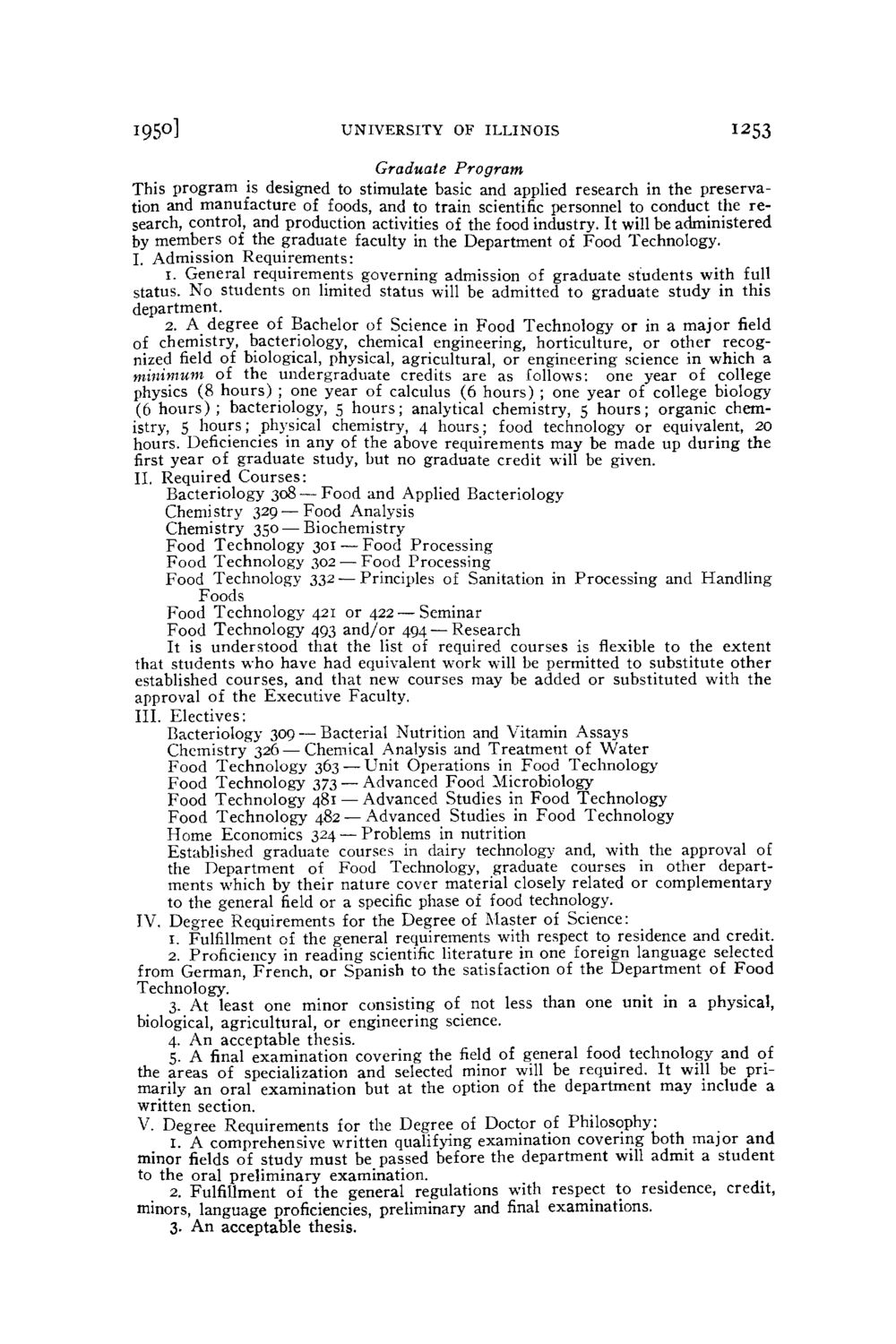| |
| |
Caption: Board of Trustees Minutes - 1950
This is a reduced-resolution page image for fast online browsing.

EXTRACTED TEXT FROM PAGE:
195°] UNIVERSITY OF I L L I N O I S 1253 Graduate Program This program is designed to stimulate basic and applied research in the preservation and manufacture of foods, and to train scientific personnel to conduct the research, control, and production activities of the food industry. It will be administered by members of the graduate faculty in the Department of Food Technology. I. Admission Requirements: 1. General requirements governing admission of graduate students with full status. No students on limited status will be admitted to graduate study in this department. 2. A degree of Bachelor of Science in Food Technology or in a major field of chemistry, bacteriology, chemical engineering, horticulture, or other recognized field of biological, physical, agricultural, or engineering science in which a minimum of the undergraduate credits are as follows: one year of college physics (8 hours) ; one year of calculus (6 hours) ; one year of college biology (6 h o u r s ) ; bacteriology, 5 hours; analytical chemistry, 5 h o u r s ; organic chemistry, 5 hours; physical chemistry, 4 hours; food technology or equivalent, 20 hours. Deficiencies in any of the above requirements may be made up during the first year of graduate study, but no graduate credit will be given. II. Required Courses: Bacteriology 308 — Food and Applied Bacteriology Chemistry 329 — Food Analysis Chemistry 350 — Biochemistry Food Technology 301 — Food Processing Food Technology 302 — Food Processing Food Technology 332 — Principles of Sanitation in Processing and Handling Foods Food Technology 421 or 422 — Seminar Food Technology 493 and/or 494 — Research It is understood that the list of required courses is flexible to the extent that students who have had equivalent work will be permitted to substitute other established courses, and that new courses may be added or substituted with the approval of the Executive Faculty. III. Electives: Bacteriology 309 — Bacterial Nutrition and Vitamin Assays Chemistry 326—Chemical Analysis and Treatment of Water Food Technology 363 — Unit Operations in Food Technology Food Technology 373 — Advanced Food Microbiology Food Technology 481 — Advanced Studies in Food Technology Food Technology 482 — Advanced Studies in Food Technology Home Economics 324 — Problems in nutrition Established graduate courses in dairy technology and, with the approval of the Department of Food Technology, graduate courses in other departments which by their nature cover material closely related or complementary to the general field or a specific phase of food technology. IV. Degree Requirements for the Degree of Master of Science: 1. Fulfillment of the general requirements with respect to residence and credit. 2. Proficiency in reading scientific literature in one foreign language selected from German, French, or Spanish to the satisfaction of the Department of Food Technology. 3. At least one minor consisting of not less than one unit in a physical, biological, agricultural, or engineering science. 4. An acceptable thesis. 5. A final examination covering the field of general food technology and of the areas of specialization and selected minor will be required. It will be primarily an oral examination but at the option of the department may include a written section. V. Degree Requirements for the Degree of Doctor of Philosophy: 1. A comprehensive written qualifying examination covering both major and minor fields of study must be passed before the department will admit a student to the oral preliminary examination. 2. Fulfillment of the general regulations with respect to residence, credit, minors, language proficiencies, preliminary and final examinations. 3. An acceptable thesis.
| |